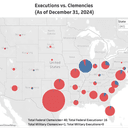
Alabama is scheduled to execute Carey Grayson by nitrogen hypoxia on November 21, 2024, for his involvement with three other teens in the death of a hitchhiker in 1994, when he was 19 years old. Mr. Grayson’ execution would be Alabama’s sixth execution in 2024, and the third by nitrogen hypoxia. The state acknowledged Mr. Grayson was not the most culpable of the group, yet he is the only one of the four teens to face an execution. Mr. Grayson, and three others, were convicted of capital murder in the torture, bludgeoning, and mutilation of Vicki Deblieux, whose body was found with post-mortem injuries. All four juveniles were tried separately, but by the same prosecutor. Two of Mr. Grayson’s codefendants, Kenny Loggins and Trace Duncan, who were both 17 at the time of the killing, were also sentenced to death. Louis Mangione, who was just 16 at the time, was sentenced to life in prison.
At each trial, the prosecutor improperly told the jury that the individual on trial was the ringleader, and thus the individual most deserving of a death sentence. At Mr. Grayson’s 1996 trial, the prosecutor identified him as the “leader of the pack” who was responsible for “driving the whole thing,” after using this same language during Mr. Loggins’ trial. The prosecutor told the juries in Mr. Duncan and Mr. Mangione’s trials that it was “ludicrous” and an “illusion” to argue that Mr. Grayson was the ringleader, as the “only” evidence against Mr. Grayson was that “[h]e drove the car.” Ahead of Mr. Grayson’s trial, his counsel requested transcripts of the other three trials, but the trial judge denied the request. Because of the judge’s denial, his counsel was unable to challenge the prosecutor’s conflicting theory at Mr. Grayson’s trial.
Mr. Grayson was found guilty, and during the penalty phase of trial, his counsel failed to present mitigating evidence, including the severe neglect he faced at the hands of his parents, how as a young boy he “went hungry” in the years after his mother’s death when he was young, how he developed mental illness because of trauma, and was homeless at age 15.
In 2005, the United States Supreme Court ruled in Roper v. Simmons, that juvenile offenders cannot face the death penalty. The Court reasoned that their immaturity, diminished sense of responsibility, susceptibility to outside pressures, and potential for rehabilitation means they “cannot with reliability be classified among the worst offenders.” As a result of this ruling, both Mr. Loggins and Mr. Duncan were resentenced to life without parole, because they were under the age of 18 at the time of the killing. This left Mr. Grayson as the only one of the four teens to face execution, despite the state’s acknowledgement that Mr. Loggins and Mr. Duncan “are every bit as culpable — if not more so — in [the victim’s] death.”
Alabama Plans to Execute Carey Grayson, Equal Justice Initiative, November 18, 2024.



